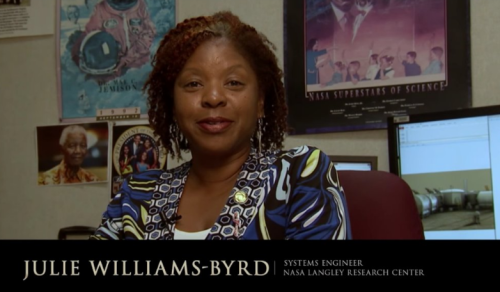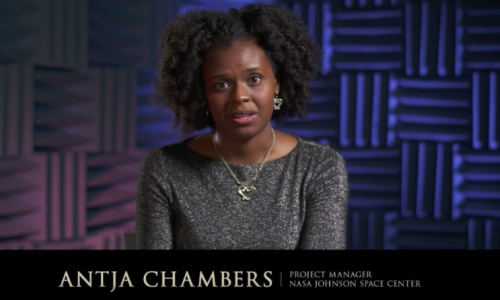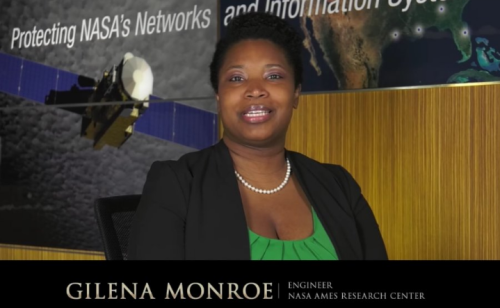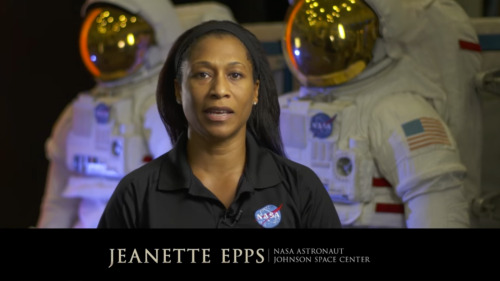With The Simplest Assumptions, You End Up With Eternal Inflation And The Multiverse. Being Conservative
With the simplest assumptions, you end up with eternal inflation and the multiverse. Being conservative on that front lands you at this radical thing.
Physicist Andreas Albrecht of the University of California, Davis. The idea of a multiverse might not be as crazy as it sounds. (via sciencefriday)
More Posts from Contradictiontonature and Others





The film “Hidden Figures,” based on the book by Margot Lee Shetterly, focuses on the stories of Katherine Johnson (left, after receiving the Medal of Freedom in 2015), Mary Jackson and Dorothy Vaughan, African-American women who were essential to the success of early spaceflight. Today, NASA embraces their legacy and strives to include everyone who wants to participate in its ongoing exploration. “Progress is driven by questioning our assumptions and cultural assumptions,” NASA Administrator Charles Bolden says in a new video. “Embracing diversity and inclusion is how we as a nation will take the next giant leap in exploration.“
- Source
Let’s learn about today’s black heroes we all can look up to!
If it is just us, seems like an awful waste of space.
Carl Sagan (from Contact)


For those poorly informed (educated) who insist that vaccines are just the same as catching the illness…. This is just one example of why that is not true.
Breakthrough for vaccine research: Mucosa forms special immunological memory
If a vaccine is to protect the intestines and other mucous membranes in the body, it also needs to be given through the mucosa, for example as a nasal spray or a liquid that is drunk. The mucosa forms a unique immunological antibody memory that does not occur if the vaccine is given by injection. This has been shown by a new study from Sahlgrenska Academy published in Nature Communications.
Immunological memory is the secret to human protection against various diseases and the success of vaccines. It allows our immune system to quickly recognize and neutralize threats. “The largest part of the immune system is in our mucosa. Even so, we understand less about how immunological memory protects us there than we do about protection in the rest of the body. Some have even suggested that a typical immune memory function does not exist in the mucosa,” says Mats Bemark, associate professor of immunology at Sahlgrenska Academy, University of Gothenburg.
After extensive work, the research team at Sahlgrenska Academy can now show that this assumption is completely wrong.
Mats Bemark et al. Limited clonal relatedness between gut IgA plasma cells and memory B cells after oral immunization, Nature Communications (2016). DOI: 10.1038/ncomms12698





Birch reduction in ethylamine as a solvent.
Birch reduction is a really special thing in organic chemistry, it’s a dissolving metal reduction, that uses alkali metals, most often lithium or sodium and in most cases liquid ammonia as a solvent.
Liquid ammonia is a quite nasty thing, it boils at -33.34 °C, and has a really bad odor, so dry ice based cooling mixtures should be used for these reactions. However, in some cases, other amines, like ethylamine could be used instead of the liquid ammonia, and in this case normal ice based cooling mixtures are also good, since ethylamine boils at ~20 °C.
The mechanism of the Birch reduction has been the subject of much discussion, but it involves radical steps and solvated electrons that could result the deep color as seen on the above picture/gifs.
For more: https://en.wikipedia.org/wiki/Birch_reduction

Different ways to achieve the same goal
via: Science, Critical Thinking and Skepticism


Today is World Anaesthesia Day! Here’s a look at the chemistry behind a range of anaesthetics. More info here and here.
Using the Power of Space to Fight Cancer
From cancer research to DNA sequencing, the International Space Space is proving to be an ideal platform for medical research. But new techniques in fighting cancer are not confined to research on the space station. Increasingly, artificial intelligence is helping to “read” large datasets. And for the past 15 years, these big data techniques pioneered by our Jet Propulsion Laboratory have been revolutionizing biomedical research.
Microgravity Research on Space Station
On Earth, scientists have devised several laboratory methods to mimic normal cellular behavior, but none of them work exactly the way the body does. Beginning more than 40 years ago aboard Skylab and continuing today aboard the space station, we and our partners have conducted research in the microgravity of space. In this environment, in vitro cells arrange themselves into three-dimensional groupings, or aggregates. These aggregates more closely resemble what actually occurs in the human body. Cells in microgravity also tend to clump together more easily, and they experience reduced fluid shear stress – a type of turbulence that can affect their behavior. The development of 3D structure and enhanced cell differentiation seen in microgravity may help scientists study cell behavior and cancer development in models that behave more like tissues in the human body.

In addition, using the distinctive microgravity environment aboard the station, researchers are making further advancements in cancer therapy. The process of microencapsulation was investigated aboard the space station in an effort to improve the Earth-based technology. Microencapsulation is a technique that creates tiny, liquid-filled, biodegradable micro-balloons that can serve as delivery systems for various compounds, including specific combinations of concentrated anti-tumor drugs. For decades, scientists and clinicians have looked for the best ways to deliver these micro-balloons, or microcapsules, directly to specific treatment sites within a cancer patient, a process that has the potential to revolutionize cancer treatment.

A team of scientists at Johnson Space Center used the station as a tool to advance an Earth-based microencapsulation system, known as the Microencapsulation Electrostatic Processing System-II (MEPS-II), as a way to make more effective microcapsules. The team leveraged fluid behavior in microgravity to develop a new technique for making these microcapsules that would be more effective on Earth. In space, microgravity brought together two liquids incapable of mixing on Earth (80 percent water and 20 percent oil) in such a way that spontaneously caused liquid-filled microcapsules to form as spherical, tiny, liquid-filled bubbles surrounded by a thin, semipermeable, outer membrane. After studying these microcapsules on Earth, the team was able to develop a system to make more of the space-like microcapsules on Earth and are now performing activities leading to FDA approval for use in cancer treatment.

In addition, the ISS National Laboratory managed by the Center for the Advancement of Science in Space (CASIS) has also sponsored cancer-related investigations. An example of that is an investigation conducted by the commercial company Eli Lilly that seeks to crystallize a human membrane protein involved in several types of cancer together with a compound that could serve as a drug to treat those cancers.
“So many things change in 3-D, it’s mind-blowing – when you look at the function of the cell, how they present their proteins, how they activate genes, how they interact with other cells,” said Jeanne Becker, Ph.D., a cell biologist at Nano3D Biosciences in Houston and principal investigator for a study called Cellular Biotechnology Operations Support Systems: Evaluation of Ovarian Tumor Cell Growth and Gene Expression, also known as the CBOSS-1-Ovarian study. “The variable that you are most looking at here is gravity, and you can’t really take away gravity on Earth. You have to go where gravity is reduced.“
Crunching Big Data Using Space Knowledge

Our Jet Propulsion Laboratory often deals with measurements from a variety of sensors – say, cameras and mass spectrometers that are on our spacecraft. Both can be used to study a star, planet or similar target object. But it takes special software to recognize that readings from very different instruments relate to one another.
There’s a similar problem in cancer research, where readings from different biomedical tests or instruments require correlation with one another. For that to happen, data have to be standardized, and algorithms must be “taught” to know what they’re looking for.
Because space exploration and cancer research share a similar challenge in that they both must analyze large datasets to find meaning, JPL and the National Cancer Institute renewed their research partnership to continue developing methods in data science that originated in space exploration and are now supporting new cancer discoveries.
JPL’s methods are leading to the development of a single, searchable network of cancer data that researcher can work into techniques for the early diagnosis of cancer or cancer risk. In the time they’ve worked together, the two organizations’ efforts have led to the discovery of six new Food and Drug Administration-approved cancer biomarkers. These agency-approved biomarkers have been used in more than 1 million patient diagnostic tests worldwide.




Separation of a highly fluorescent anthranilic acid derivative from the reaction mixture.
The upper organic layer dissolved almost completely my compound from the reaction mixture and could be separated in one step. A good point was that the compound had a really strong fluorescence and if I placed an UV lamp next to the separation funnel it was easily observed that the water phase contained almost none of the title compound.
-
 marty1956 liked this · 8 years ago
marty1956 liked this · 8 years ago -
 pandaemoniumpancakes liked this · 8 years ago
pandaemoniumpancakes liked this · 8 years ago -
 pocketrunner reblogged this · 8 years ago
pocketrunner reblogged this · 8 years ago -
 coffieldelectric liked this · 8 years ago
coffieldelectric liked this · 8 years ago -
 banditbrineshrimp liked this · 8 years ago
banditbrineshrimp liked this · 8 years ago -
 purpurella-v liked this · 8 years ago
purpurella-v liked this · 8 years ago -
 banhmipatechachabong-blog liked this · 8 years ago
banhmipatechachabong-blog liked this · 8 years ago -
 dackdel liked this · 8 years ago
dackdel liked this · 8 years ago -
 flower-femme liked this · 8 years ago
flower-femme liked this · 8 years ago -
 inthisquarter liked this · 8 years ago
inthisquarter liked this · 8 years ago -
 uptownanabelle liked this · 8 years ago
uptownanabelle liked this · 8 years ago -
 vbx2010 liked this · 8 years ago
vbx2010 liked this · 8 years ago -
 passer-fringillidae reblogged this · 8 years ago
passer-fringillidae reblogged this · 8 years ago -
 procrastinationvortex liked this · 8 years ago
procrastinationvortex liked this · 8 years ago -
 brokenmusicboxwolfe liked this · 8 years ago
brokenmusicboxwolfe liked this · 8 years ago -
 onlyatomsandthevoid liked this · 8 years ago
onlyatomsandthevoid liked this · 8 years ago -
 cattyfantastic liked this · 8 years ago
cattyfantastic liked this · 8 years ago -
 thesacreddraught liked this · 8 years ago
thesacreddraught liked this · 8 years ago -
 abandonedpagecantdelete liked this · 8 years ago
abandonedpagecantdelete liked this · 8 years ago -
 vizardboy19 reblogged this · 8 years ago
vizardboy19 reblogged this · 8 years ago -
 vizardboy19 liked this · 8 years ago
vizardboy19 liked this · 8 years ago -
 neuro-slut liked this · 8 years ago
neuro-slut liked this · 8 years ago -
 dendroica liked this · 8 years ago
dendroica liked this · 8 years ago -
 contradictiontonature reblogged this · 8 years ago
contradictiontonature reblogged this · 8 years ago -
 sciencefriday reblogged this · 8 years ago
sciencefriday reblogged this · 8 years ago
A pharmacist and a little science sideblog. "Knowledge belongs to humanity, and is the torch which illuminates the world." - Louis Pasteur
215 posts




